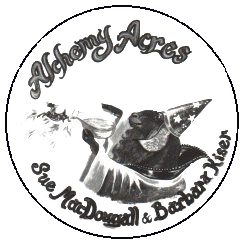
















Seems like the heat and humidity here in the South (and elsewhere in the country, I suspect) bring out all the disease-carrying wee-beasties. In addition to the plethora of parasites and worms, we now have a couple more ailments about which to worry.
The first disease about which I worry is lime disease. This is carried by the deer tick. Symptoms include a "bulls-eye" rash (not always present) followed by stiffness of joint. This can be a very serious malady if it is not treated promptly. However, I've found that its fairly easy to avoid this problem simply by keeping dogs and chickens. The deer don't like to come near the Pyrenees, and the chickens snarf down the ticks (and anything else that isn't nailed down). If an animal does get lime disease, it can be treated with tetracycline and some other antibiotics.
The second disease is somewhat more nettlesome - perhaps because it is newer and I know less about it. I'm referring in this case to the West Nile Virus (WNV). WNV is a form of encephalomyelitis that was first detected in the US in 1999 in tissues taken from infected birds in the New York City area. The virus, which is transmitted by mosquitoes, causes inflammation or swelling of the brain and spinal cord and can result in death. The disease spreads when mosquitoes bite infected birds and then feed on horses, humans or other mammals. The disease has been very well-publicized of late because it does affect human beings, as well as livestock. After an infected mosquito has bitten a mammal, it may take only 5-15 days before the symptoms of WNV appear.The symptoms can be easily confused with those of rabies, and several other serious neurological disorders. Symptoms can include:
Prevention begins with mosquito control. Ponds, water troughs and buckets, puddles, or any other areas that hold water for more than four days are prime targets for mosquito breeding. Water buckets should be cleaned out at LEAST once a week - preferably daily if you want healthy animals. For ponds, mosquito dunks are available through your local Co-op. I know very little about these dunks so am going to have to chat with both my veterinarian as well as the good folk at the Co-op before I use these. Protecting your livestock from mosquitoes means having a good repellent program. The Co-op offers several products that are excellent in combatting mosquitoes. However, be sure to read the labels carefully, as many cannot be used on lactating animals. Avon has a "Skin-So-Soft" repellent available, also. There is a vaccine for horses that protects against WNV. It is available only through a licensed veterinarian, and, of course, is not yet approved for goats or sheep. You might want to talk to your vet about this product. I'm not certain as to the treatment if an animal does come down with the WNV disease. I do know that it has had a 50% mortality rate in horses, which surely doesn't sound good to me.
Perhaps we should all give some thought to our disease prevention program in this off-season, so that we can be better prepared come next Summer. Best wishes, and we'll be back again next month with a bit more cheery topic, hopefully.







